F L A U N T

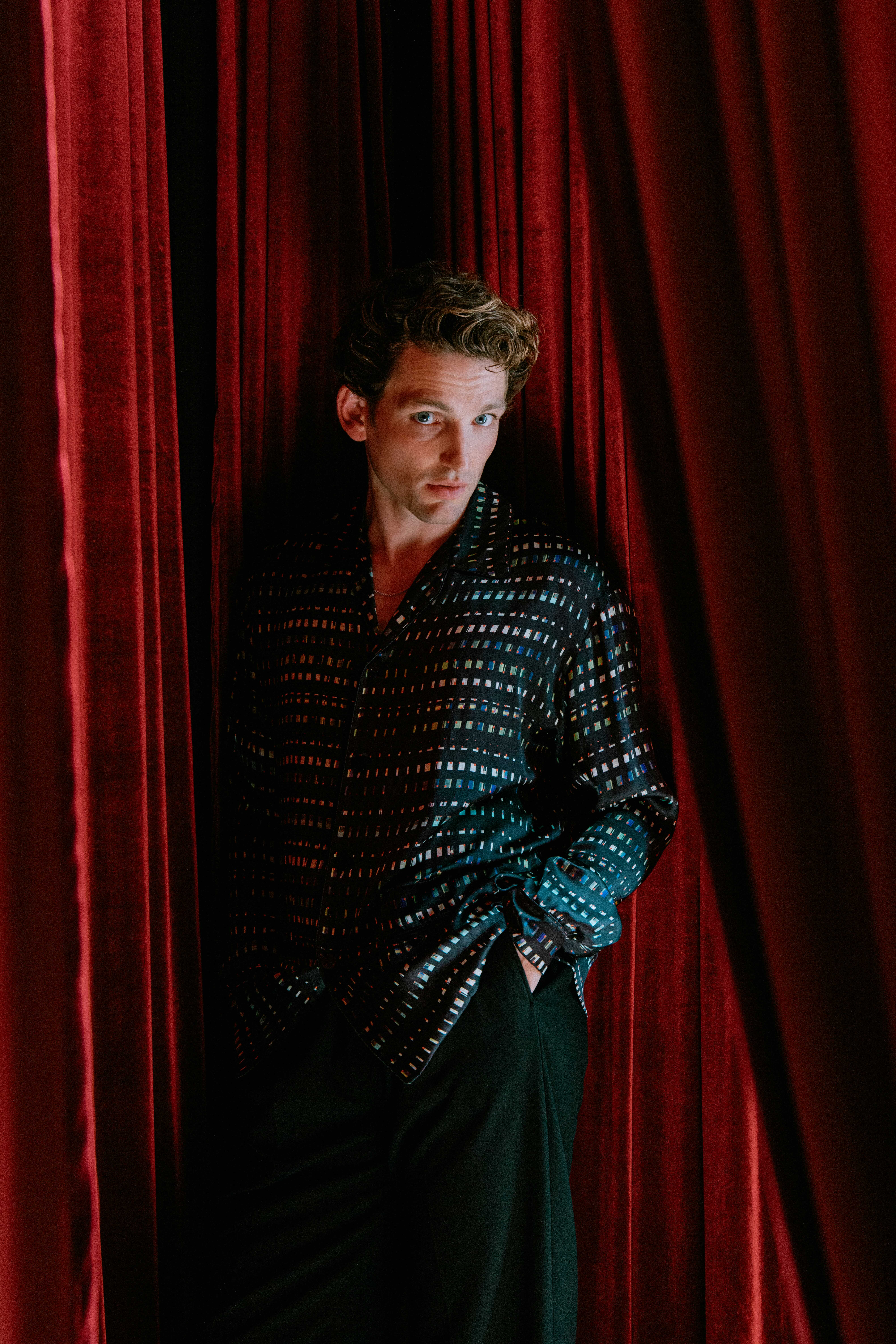
Have you ever been caught in between two lovers who genuinely can’t stand one another? Two friends who are constantly fighting? A sibling who doesn’t talk to your parents and expects you to constantly fill the intermediary role? Romantic or platonic, being the object of two people’s affection is strained when the love between all parties cannot be shared. But what if something deeper was happening? Something darker? And there was nothing you knew of to do to stop it?
For Laurie Davidson—the actor who plays Daniel in the suspenseful and chilling new love triangle series The Girlfriend, produced by Amazon MGM Studios and available on streaming now—denial is not only a strategy for dealing with antagonism, but a strong character deficiency.
Based on Michelle Frances’ namesake novel, The Girlfriend follows Laura, Daniel’s possessive and quasi-incestual mother, played by actor and series director Robin Wright, and Cherry, Daniel’s beautiful and suspicious new girlfriend (Olivia Cooke), who each raise red flags after a tense introduction leads to high stakes of overall paranoia. Told through dual perspectives, Davidson portrays both a painfully uncomfortable mama’s boy and a strangely hopeless romantic—leaving viewers to question where Daniel’s loyalty really lies and how his character handles inner conflict.
Before landing his role as Daniel, Davidson appeared as a fictionalized version of young William Shakespeare in TNT’s 2017 Will, considered to be his breakout role, as well as Mr. Mistoffelees in Tom Hooper’s Cats, David Blakely in A Cruel Love: The Ruth Ellis Story, and Michael Lewis in TV drama Diana and I, among others. A graduate of the London Academy of Music and Dramatic Art, Davidson got his start acting by doing theater on-stage, cultivating a passion for thoughtfully prepared and highly stylized performances.
Davidson recently wrapped production of Prisoner, a new action-thriller series from Sky, and is currently filming The Other Bennett Sister, a ten-part BBC series which tells the story of Mary Bennett, the largely overlooked middle sister in Jane Austen’s Pride and Prejudice, in which Davidson stars as one of the romantic leads. The bright-eyed, London-born actor sat down with FLAUNT to discuss his theater upbringing, his love for historical dramas, and, whether it be on-stage or on-screen, what it takes to get into character each time.
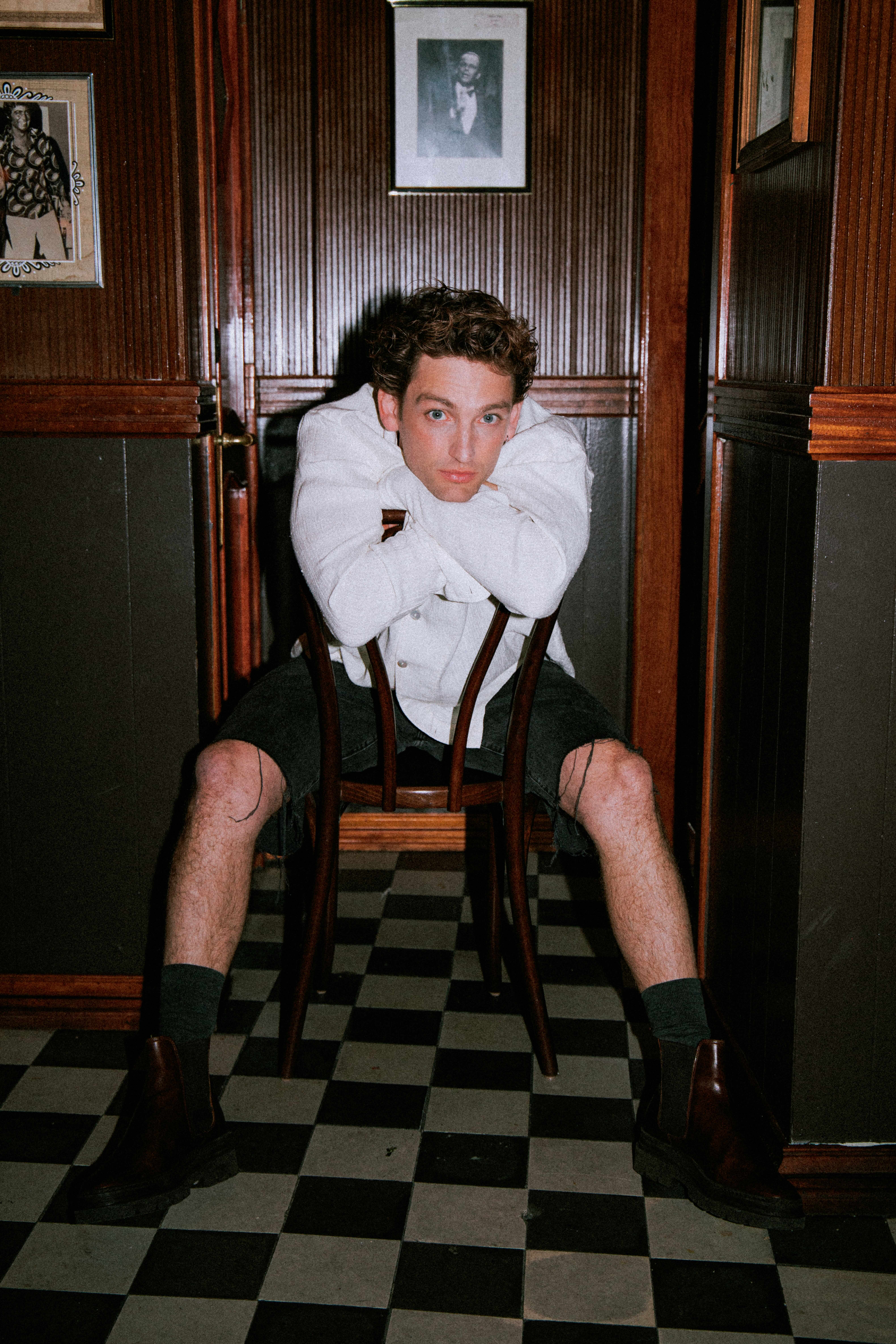
Tell me about how you first got started acting. I know you come from more of a traditional theater background—what initially drew you in front of the camera?
Before I started working as an actor, I was doing more theatrical stuff, and then I went to drama school and that training was largely theatrical. I guess at that point, I had ideas that I was always going to just work in theater, but there’s not actually that much work in theater, comparatively. And my first ever job while I was still at drama school was when I auditioned for a pilot of Will, which was a Shakespeare show for TNT, and we shot that, and that was really kind of the first time I had really been in front of a camera. We had done it a little bit prior to that at drama school, but it was a real learning curve, a steep learning curve, but such an amazing opportunity to learn about how [on-screen acting] works. I was in every scene pretty much and did a whole series after that. So just getting that time [was really helpful]. It’s like if you’re an athlete, you just need match time to get up your skills, and it was really like that. I was so lucky to be able to spend that much time in front of a camera for my first job. After that, I had a bit more of an idea of what I was doing, but you know, even now, none of us really know what we’re doing. We’re just making it up as you get along.
Right. Just trying to find the next thing to do and moving forward from there.
Yeah. I think when you’re young, you think, “Oh, when I master camera acting…” we have these ideas [that] you’re going to have this big epiphany moment or a big discovery. But then those goal posts just keep shifting as you get more and more competent and adapt to stuff. So yeah, it’s always shifting. But now I love it. And I want to do more and more and more. It’s one of those things that the more you understand and the more nuanced things become, the more exciting projects and the more exciting creatives you get to work with, you just want to do more and more and more. I’m really excited to be able to get the chance to do more film in the future. The last couple of years have been great in the TV world, but I’m hoping to definitely expand into the film world.
How does your background in theater affect your onscreen sensibilities?
I think I really appreciate a rehearsal. You get used to doing theater—you stand up and when you don’t really know the lines, it’s quite exposing. And I think getting good at being able to feel silly and to play and fail—that’s especially [important]. What’s hard about transferring that [to camera acting], but it’s also fun, is [that] you often get very little rehearsal on television or film. It can be easy to become scared and just play a really safe choice. But the skill I’ve tried to find is to still make fun and bold choices and, if they don’t work the first time, you can try something else. And some of the really good experiences I’ve had have been rehearsing something quite extensively before, at least blocking it. I find blocking something quite extensively before shooting it [helps me], so that every position or every mood feels grounded in reality, and that it’s all coming from a motivated place rather than arbitrary blocking.
In television, it can be hard sometimes because of the speed. It’s always nice when you feel like the shape of a scene is motivated by things rather than just to suit a particular image that someone has in mind. But it’s definitely different. And every time you go back, one between the other, that’s the hardest time. Like, if you’ve done loads of television for ages, and then I go and do a play, you should really feel the difference. It’s like being on ice skates for the first time in ages. So you have to keep trying to do both, to keep those skills up, because they are different. The essence is the same, but it’s a different medium.
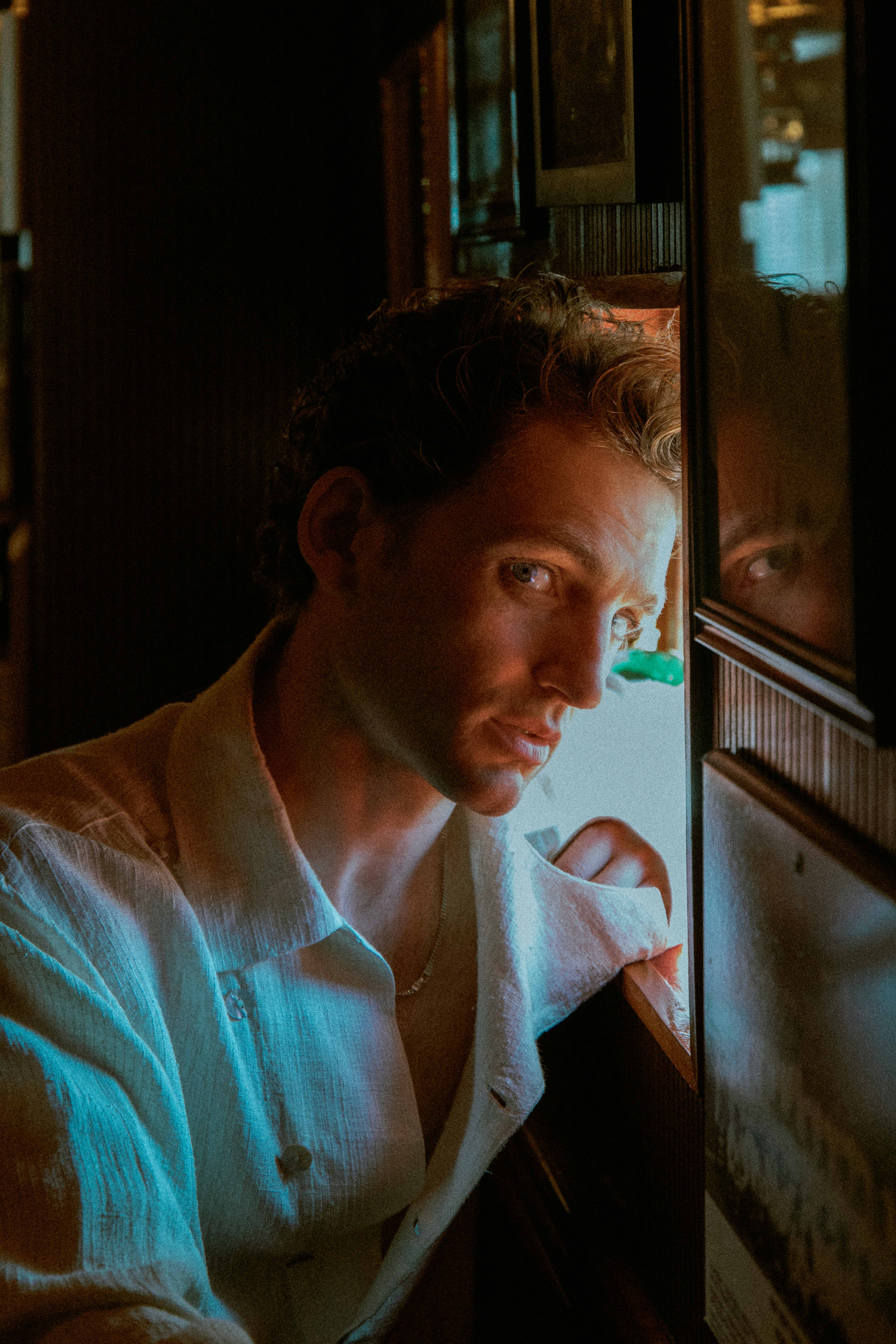
More recently, you star as Daniel, the son who brings a mysterious girlfriend home to meet his parents in The Girlfriend. When the introduction goes awry, paranoia creeps in and tensions rise. We haven’t seen you in many psychological thrillers. What was it like preparing for this role?
I was aware that Daniel doesn’t know he’s in a psychological thriller, and that’s important. He is—for a large part of the series—in love, and that’s the main thing. He’s just with this new person and going through everything that that brings with it. His world is shifting very quickly, but it’s great, and he’s unaware of the other things that are at play, and when he finds out, he wishes he were still unaware. That’s what I latched on to, was that here’s a guy who just wants these two women to get on so well that it’s almost an avoidance strategy. He’s just avoiding really dealing with [the tensions] because he can’t possibly fathom having to lose one of these people or even see them in [a bad] light.
What was so interesting about shooting this one is that it’s shot from two different perspectives. And what I found really fun is that I could shoot the same scene, but depending on whether it was Laura’s perspective or Cherry’s perspective, I would lean into something else. I would lean into either him being all over Cherry and PDA and them being too much or, on the flip side, when I was shooting something from Cherry’s perspective, him being a real mommy’s boy with a questionable closeness to his mom. And the truth is probably somewhere in between, but, because we were shooting from different perspectives, it was quite fun to play the same scene and just lean one way or the other a little bit more. We’ll do several takes of something, and I can do several takes and try it several ways, but usually in the edit, the audience only gets to see one, so it’s quite fun to have two different choices being shown.
What was it like to both act alongside but also under the direction of Robin Wright, who plays your mother in the series?
Either/or would have been an absolute gift, but I got to do both. It was really special. Because she’s such a brilliant actor and gets actors being directed by her, she has such a shorthand. She totally understands it. There’s no mystery for her on what an actor’s process is, and it also offered up some really unique opportunities that I’d not really thought of. For example, like usually when you’re doing a take and a director is watching the monitor, you might get halfway through and [usually a director would] let the whole take run before they say ‘cut.’ Robin was able to direct me in the scene throughout her performance. She can tweak something that gets something different out of me, which is really a unique thing.
But also, in other ways, it was quite strange having Robin there because we’d shoot intimate scenes with Olivia, and then we would be shooting mother-and-son scenes, and it felt very real and very meta because we have a lot of those awkward moments in our show. The fact that it was awkward was a good sign that the dynamics were really there between us.
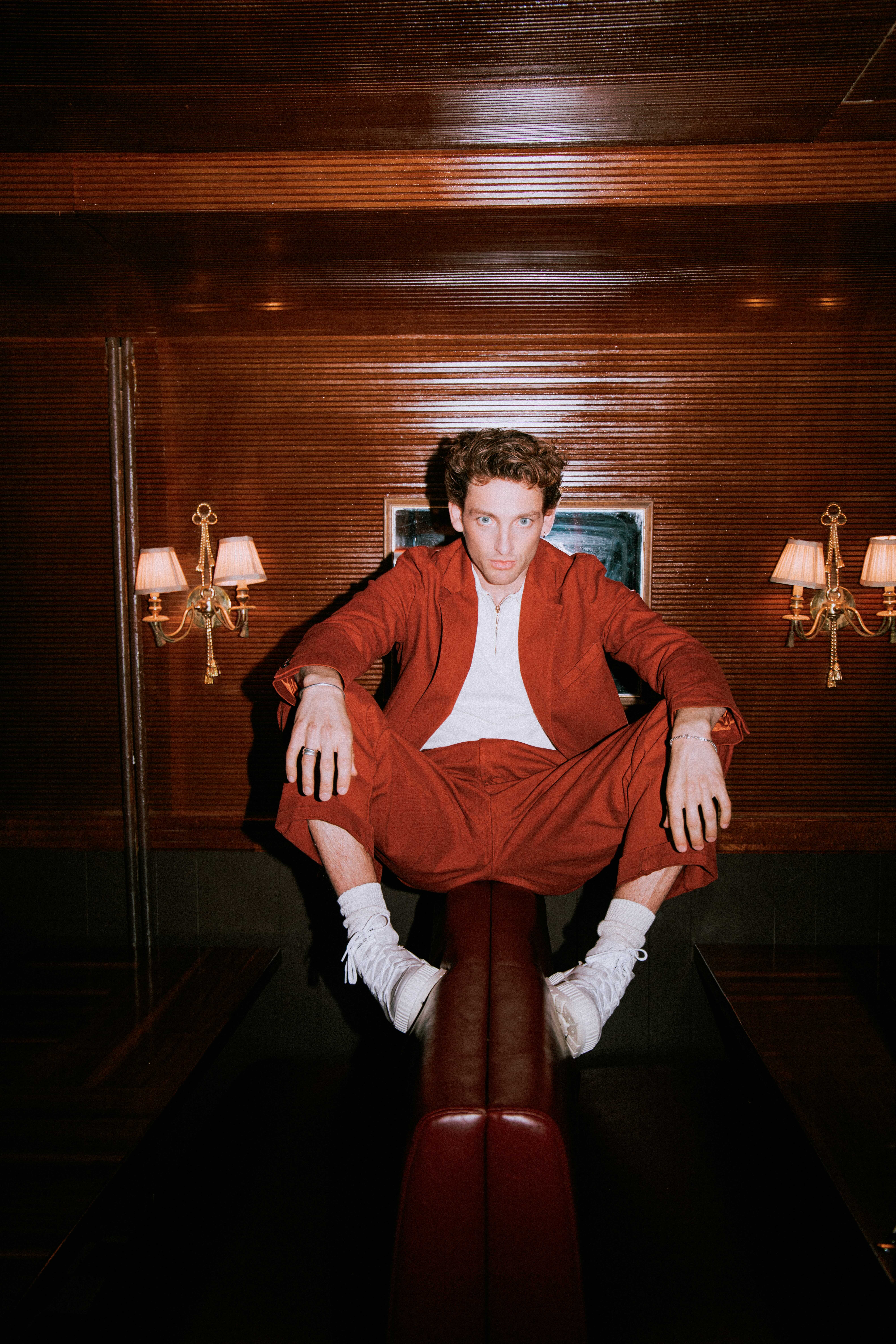
Beyond The Girlfriend, you have an impressive roster of upcoming projects, including Prisoner and The Other Bennett Sister. How do you choose your roles nowadays? Is there a certain kind of script or character you really gravitate towards?
I’m really lucky that [over] the last few years, I seem to play these very lovely, likable characters. They’re kind of very sunny, golden boys that have lots of lovely energy. They’re like fun puppies, basically. And then on the flip side, I’ve also sandwiched in some really nasty people. I played an awful guy in A Cruel Love: The Ruth Ellis Story. David Blakely was an abusive partner. And in Prisoner, I play quite an unsavory character who’s very ambitious but also just a bit slimy. I’m really lucky that I get to go between the two—you get to flex different muscles. I think if you’re doing something the same, playing the same type of roles every single time, I think you’d inevitably [burn out]. It’s more fun to be challenged in a different way. And also, every time you go between, you can bring something [new]. There’s a lot of gray. When I play someone who’s one of the darker characters, it’s fun to bring the lighter shades to them. That’s always the kind of goal to bring some light to the dark and vice versa. And I think going between the two really allows me to do that.
From Will, Diana and I, Mary and George, and now The Other Bennett Sister, you have a really strong portfolio of period dramas. Is there another genre you want to similarly sink your teeth into?
I love the period stuff because I think selfishly, it’s really fun to escape into a world like that. You know, you put on clothes that are different, the worlds are just different. It’s a really fun experience to go back; the music is different. When you’re getting into character, listening to interesting music to take you there [is helpful]. I think I’ve been very fortunate to do some of the stuff from bygone eras.
To be honest, there’s no one particular genre or style—it just depends. You know, you read a script and it’s like going to choose a dog. You shouldn’t go in with a mindset of like ‘I want this, I want that,’ But when you see that puppy, you’ll know. And I think it’s like that when you read a script. I read everything that I get sent, and you just never know. And you can only really make decisions based on good scripts because if that’s not there, that’s all you have at that point.
So yeah, I don’t have a specific thing. I’m really interested in getting more into the longer format of film and more of a character study, where we spend more time with a character. And I’d love to sink my teeth and like deep delve into one person, one character, and spend some real time with them. I’m looking forward to doing that, but in terms of type of piece or genre, no, I don’t have a preference. But I’m like that with everything—with food, music—there’s no preference, it just has to be good.
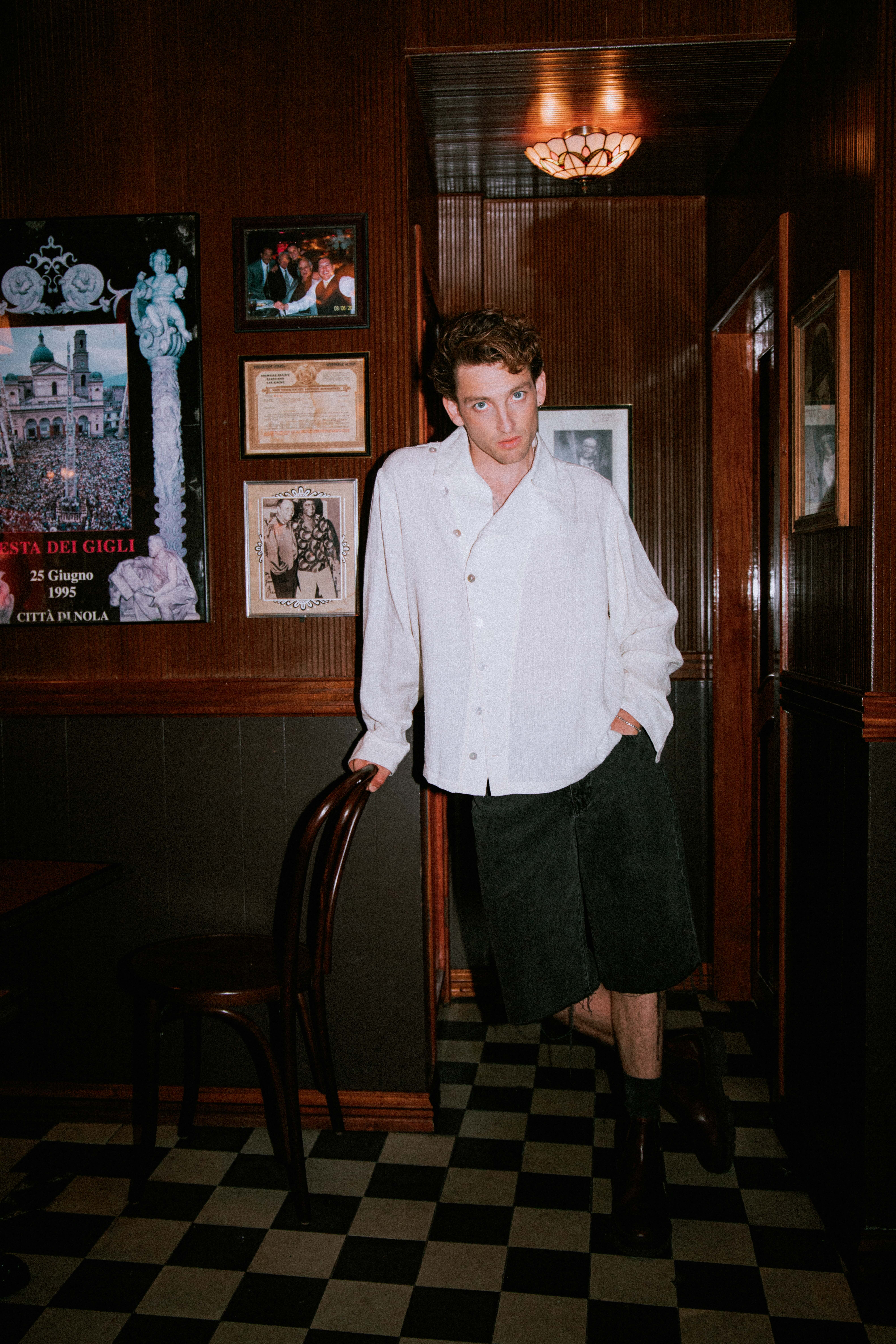
Photographed by Patrick Donovan
Written by Brynn Shaffer
Grooming by Jodie Boland